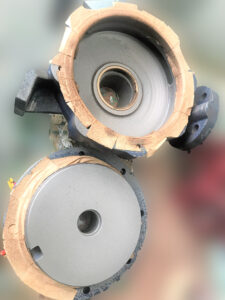Grit Blasting
Grit Blasting
Grit blasting, also known as abrasive blasting, is a process used to clean, roughen the surface by forcibly propelling a stream of abrasive material against it. This technique is essential for surface preparation and maintenance.
Applications
Surface Preparation
Before painting, coating, or bonding, surfaces often need to be cleaned and roughened to improve adhesion.Rust and Paint Removal:
It is commonly used to remove rust, old paint, and other contaminants from metal surfaces.- Texturing:
Creating a desired surface texture for aesthetic or functional purposes. - Cleaning:
Used in industries like automotive, aerospace, and construction to clean parts and surfaces.
Materials:
Abrasives:
Common abrasives include sand, steel grit, glass beads, aluminum oxide, silicon carbide, and more.Media Choice:
The choice of abrasive material depends on the hardness of the surface being treated and the desired finish.
Equipment
Blasting Cabinets
Enclosed spaces where small items are blasted.- Blast Rooms:
Larger enclosures for bigger items. - Portable Blasters:
Used for fieldwork where mobility is required.
Process
Setup:
The surface to be treated is prepared, and the appropriate abrasive material is selected.Blasting:
The abrasive is propelled at high-speed using compressed air or a centrifugal wheel.Inspection:
The surface is inspected to ensure it meets the required standards.
Safety:
Protective Gear:
Operators wear protective clothing, masks, and eye protection to guard against inhaling dust and abrasive particles.- Ventilation:
Proper ventilation is crucial to manage dust and debris. - Noise:
Blasting operations can be loud, so hearing protection is also important.


